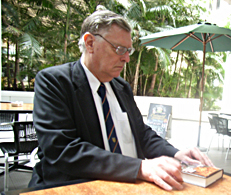
Australian Hal Colebatch is a writer, journalist, editor and lawyer. He not only writes stories for Larry Niven's Man-Kzin Wars series (including several in Man-Kzin Wars XI coming out in October 2006), but also poetry, nonfiction and political commentary. He was awarded the Australian Centenary Medal in 2003 for services to writing, poetry, the law and political commentary.
He has been admitted to practice in the Supreme Court of Western Australia and the High Court of Western Australia as a barrister and solicitor and admits, finding time for writing "is sometimes difficult."
He got started writing early, and his parents started him off on the right foot. "When I was a small child my parents and grandparents read to me, gave me books, and made sure I loved literature and stories. They read to me, and encouraged me to read, all sorts of things--poetry, science, the classics ... I really began to think of myself as a 'writer' in my final year at Leederville Technical School, when I met others who were interested (also girls I wanted to impress! I was quite a good basketballer but basketball wasn't big-time where I was, so I had to do something). I then began work as a cadet reporter on the local paper. I began to get poetry published in various literary magazines, and built up from that. I am glad I did not go straight to University. Early influences included Kipling, Evelyn Waugh, G. K. Chesterton, H. G. Wells, Arthur Ransome. Later William Golding, Tolkien, Poul Anderson, C.S. Lewis ... but the list goes on and on. Of course, there can be a difference between a writer one admires greatly and a writer who influences one."
Among that list of greats, Colebatch also read some science fiction early including, H.G. Wells' "The Time Machine as a young teenager, certainly." " The first Larry Niven story I read was The Soft Weapon."
Even though he is well published in other fields he likes writing science fiction for several reasons. "I enjoy writing novellas, long short stories. SF seems the only market for them now. I think in SF you can do everything you can in a mainstream novel, and more. Also, I think it's the most alive literature today: go into an SF-Fantasy bookshop or convention, and you find knowledgeable, enthusiastic people who are having a literary experience--you don't get that with much so-called 'mainstream' literature now.
SF also seems to be a very good means of taking on deconstructionism, post-modernism, political correctness and suchlike contemporary plagues. It allows you to deal with themes which, because of political correctness and postmodernism, simply wouldn't get published in mainstream fiction today, and to deal with genuinely thought-provoking ideas, while not necessarily losing anything in the way of character, plot and style."
As you would expect, Colebatch's list of favorite nonfiction is long and varied. "Probably still those listed above as early influences, plus many more, too many to list--Berkley Mather is one and, most of all, Michael Wharton (the London Daily Telegraph columnist "Peter Simple"). Among poets, Douglas Stewart, James McAuley, A. D. Hope, Les Murray, Lee Knowles and Peter Kocan--all these are Australian. Among nonfiction writers, Edmund Burke and Adam Smith. P. J. O'Rourke. Mark Steyn. Many political writers and philosophers of the anti-totalitarian kind."
In discussing his own work in the Man-Kzin Wars, Colebatch admits that he particularly likes "Dimity and Vaemar, and Leonie and Raargh as partnerships. I guess Vaemar is my favorite." He sees "Dimity [as] a beautiful blonde, like Shelley Long in Cheers, or perhaps like Eowyn in the Peter Jackson movie of The Lord of the Rings. Leonie is like Arwen in LOTR but with light-brown hair." And Vaemar, of course, is a kzin - hard to find good casting for that right now.
For Colebatch the best part of writing in Larry Niven's Man-Kzin Wars Known Space is "Standing on the shoulders of giants--Larry himelf, of course, Poul Anderson, Steve Stirling, Jerry Pournelle etc." Even though he is writing in a universe created by other writers, he finds "liberated Wunderland is my favorite part of the playground and I certainly don't feel constrained there."
Colebatch has more practical experience with politics than most writers and that certainly has influenced his fiction. "I think all experiences a writer has to help with writing. My father and maternal grandfather were both politicians -- my father was briefly Premier of Western Australia, an Australian Senator and for about 10 years West Australian Agent-General (i.e. ambassador) to London and Europe. I have recently published a biography of him, Steadfast Knight. (He was actually knighted but the title is a reference to the fact he was also a chess champion.) He was an old man when I was born, so I had little practical experience through him or his contemporaries, but reading his speeches and other writings, I have picked up a bit. I worked for two years at the Australian Institute for Public Policy as editor of a series of booklets on social and political issues and I have worked on the staff of a couple of Australian Federal Ministers. I think the most important thing I've picked up from all this is that if you don't have a good understanding of economics, trade and political economy, your whole understanding of the world will be handicapped, and certainly your writing."
For more information about Hal Colebatch please go to: http://www.the-rathouse.com/HalColebatch.htm



